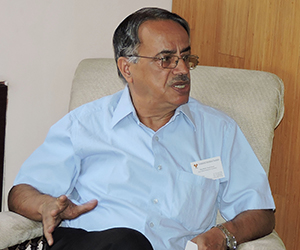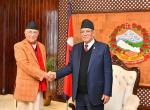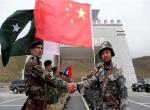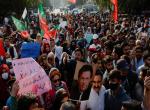The year 2015 is being seen as very crucial for democratic transition of Myanmar as it is due to go for elections in November. From an Indian perspective a peaceful transition in Myanmar remains very important as the countries in India’s neighbourhood especially Afghanistan, Pakistan, Nepal and Bangladesh to an extent have elements of instability of varying degree.
In 2011, Myanmar discarded military dictatorship in favour of some sort of semi-democracy. A number of political, economic, social and administrative reforms were introduced; though there has been some movement forward in the reforms, this movement has largely been excruciatingly slow. The military dominated or one could say quasi-civilian government still wields considerable influence and has been rather reluctant to dilute its hold over levers of power.
At a year-end press conference in 2014, the pro-democracy Burmese leader Aung San Suu Kyi had said that for the great majority of Burmese people, there has been very little improvements to their lives. “I don’t think 2014 is exactly the kind of year that you can be particularly proud of. We have to work a lot harder in 2015.”
Although it is difficult to predict how things will eventually turn out in Myanmar’s long march to democracy, it can be said that the journey is most likely to be a slow, painful and long haul. The possibility of complex power games between the various stakeholders as also likelihood of violence cannot be ruled out.
Political Power Play
Despite the political tussle between various influential players, it is quite certain that the elections will be held in latter part of the year. However, there are many challenges before both people and leaders of Myanmar in order to achieve the goals of peace, stability and prosperity in the country.
Political and security trends indicate that there is an intense struggle between the various elements of the dominant political dispensation. The question of amendment to the Constitution, especially to accommodate Aung San Suu Kyi, continues to hang in balance and the goal national reconciliation seems to be still far away; The issue of federalism versus unitary state issue is deadlocked while the military continues to call the shots.
Myanmar's ruling Union Solidarity and Development Party (USDP), or one could say the Army’s own Party remains in dominant position; the distribution of power structure based on 2008 Constitution is such that the USDP along with military members of the Parliament enjoy overwhelming power. On other hand, it can also be said that they do not necessarily hold similar views on a number of political issues. If USDP wins the election--which cannot be ruled out given current political scenario--the question is who would be at the helm of affairs post elections?
For one, President Thein Sein who has implemented the ongoing reforms in the last three years and was seen as one term President is apparently in the run for the second term too. Shwe Mann, the speaker of the lower house of parliament, and who is Chairman of the USDP is another contender and has often depicted himself as keeping parliamentary oversight or rather envisioned himself as a check on Thein Sein's executive branch of government. During his visit to the US in end April Shwe Mann has remarked that he was open to cooperating with Aung San Suu Kyi and if necessary could form a coalition government. He also mentioned that his party had "aspirations" to change the military-dominated constitution, but indicated time was running short ahead of November general elections.
On the other hand, Khin Aung Myint, the Speaker of the Upper House has been hinting that he is not in favour of amending Constitution to enable Suu Kyi to stand for presidency. Many Myanmar watchers believe that this is just a tactic or politics at best to paint a situation where two factions, one hard line and the other pro-reform exist in USDP whereas in reality there is no such division and all the USDP leaders are all united in their goal to prevent Suu Kyi from coming to power.
And then there is the military's commander-in-chief, Min Aung Hlaing, who is also believed to be in the fray. Though the general wisdom is that the competition is more between Thein Sein and Shwe Mann and Min Aung Hlaing has been backing the president so far despite some indications that he could also run for the presidency.
Undoubtedly, Aung San Suu Kyi remains the most charismatic leader who could pose a threat to presidential ambitions of aforementioned contenders. The opposition National League for Democracy (NLD) headed by Suu Kyi remains the largest opposition party and is expected to gain ground in the elections though it is not particularly strong in many ethnic areas. The last elections of 2010 were boycotted by the NLD but it took part in by-elections of 2012 for the central parliament where it won 44 out of 45 seats indicating a groundswell of support in favour of NLD. Aung San Suu Kyi has been campaigning for amendment of the Constitution that bars her from becoming the President. There has also been some degree of criticism within NLD on Suu Kyi’s political astuteness or lack of it as she has again warned the government that she may boycott of coming elections if Constitution is not amended. But there are others who believe that this is just a tactic to force the military dominated government to hasten political reforms especially bringing in the amendment to the Constitution.
Amending the Constitution: A Bridge Too far
In a major development in early February, Myanmar’s President had approved holding of a referendum in May on amendments to military-drafted Constitution. The Election Commission was to give out a date for the process to begin but no preliminary work has been done so far. It is quite evident that the current dispensation is in no hurry to usher in amendments to the Constitution. Aung San Suu Kyi has been at pains to push the issue primarily because of the extensive powers that the Constitution grants to the military under the current arrangement. The talks between six different entities--President, Lower House and Upper House Speakers, the Army Chief, ethnic parties’ representatives and Aung San Suu Kyi--took place in early April to discuss Constitutional reform the outcome was inconclusive.
According to reports, the results in the referendum for amending the Constitution even if it were to be held, would only be approved after the 2015 election. In any case, amending the Constitution becomes a well nigh impossible proposition with 75 per cent law makers required to vote in its support. The prospects look difficult when 25 per cent members of Parliament are serving officers of the military. Thus, right now the military exercises an effective veto over any changes to the Constitution. Further, the relevant procedures prescribed in the Constitution do not specify a time frame for the Parliament to ratify successful amendments.
Electoral reforms in the shape of substituting the present system of first past the post with proportional representations or a mix of both have also been mooted. It was perceived that proportional representation system would have helped USDP at the hustings but strangely the proposal did not find favour with the ruling dispensation. In any case, it appears that at the current juncture not enough time is left for introduction of such a major electoral reform before the November elections.
National Reconciliation: Not an Easy Task
Ethnic groups and their reconciliation with the Myanmar’s regime remains one of the most significant factors that can bring in political stability in the country. Apparently, in end-March this year a tentative agreement between the Government and the National Ceasefire Coordination Team (NCCT) representing 16 ethnic groups was reached. Signing a nationwide cease-fire agreement was viewed as being central to the success of reform and development in the country. It was decided that the draft of the agreement would be considered by each of the groups before being ratified by them. Once confirmed, the agreement is expected to lead to a political dialogue resulting ultimately in resolution of the long-pending issues between the ethnic groups and the government.
While the 16 ethnic groups are part of the tentative agreement, there are other groups like National Democratic Alliance Army of Kokang region, United Wa State Army, Arakan Army and Tang national Liberation Army are out of the purview of the agreement reached recently. In fact, in early May these groups in a meeting at Pangshang on the Sino-Myanmar border have made it clear that they will not abide by the agreement reached by the NCCT with 16 ethnic groups. Sporadic clashes between the Kokang, Palaung and Arakanese rebels and the government troops have been taking place. This development goes against the general trend wherein a forward movement was taking place in working towards a solution to the vexed issue of national reconciliation.
There are major points of differences. While the ethnic groups seek large degree of autonomy under a federal structure, the Myanmar government is more inclined towards granting a nominal autonomy under a federal structure. The rebel groups refer to Panglong Conference negotiations with Baman leader General Aung San and other ethnic leaders in 1947 as the right model to be followed. The agreement accepted ‘Full autonomy in internal administration for the Frontier Areas’ in principle and envisioned the creation of a Kachin State by the Constituent Assembly. It continued the financial relations established between the Shan states and the Burmese federal government, and envisioned similar arrangements for the Kachin Hills and the Chin Hills. In the current scenario the ethnic groups have talked about various types of federal systems, such as those of Switzerland, Germany, India and Brazil. Some of the armed ethnic groups prefer a federal model based on the United States because all US states have their own constitutions. However, Myanmar regimes have been strongly opposed to autonomy that they believe has elements of separatism.
Thus a degree of decentralization and devolution of powers is a must for any viable political solution to emerge. Recognition of ethnic rights with autonomy and power-sharing by the provinces/regions are critical aspects that need to be addressed by the Myanmar government. It also seems unlikely that a political solution would be found before the November elections given the complicated political and security scenario and inability of the stakeholders to strike a compromise on several contentious issues.
Conclusion
While there are many uncertainties associated with ongoing political and security transition, successful conclusion of the coming elections and transfer of power to the next dispensation is expected to contribute to political stability. Tatmdaw which has been at the helm of affairs for several decades will not find it easy to give up its power and privileges enshrined in the current Constitution. Though the military has embarked on the path to reforms the progress has been very limited. In the coming elections Suu Kyi’s NLD Party is likely to gain majority of the seats though the USDP would also be a serious contender. The question of Suu Kyi being allowed to run for the presidency remains in a state of flux. Accommodating Suu Kyi and letting her stand for the presidency would show the current regime in a good light. However, most indications are that present regime is unlikely to amend the Constitution in a manner that enables her to stand as a presidential candidate. Possibilities of rigging and violence during the elections cannot be ruled out either.
Though the national reconciliation would contribute greatly to the political and security transition the chances of eventual reconciliation taking place before the elections do not seem to be bright. Making peace with the ethnic armed groups and devolution of powers to the provinces and local administrations would go a long way in ushering in long term stability and prosperity. Depending on the election results some power sharing arrangement between the main contenders like Shwe Mann, Thein Sein and Suu Kyi is likely.
In so far as India is concerned, it needs to encourage the ongoing political, security and economic transitions without appearing to be interfering in Myanmar’s internal affairs. Democratization and opening up of Myanmar to the West would be strategically advantageous to India in many ways especially in pursuit of its ‘Act East’ policy.
Published in Published in Vivek: Issues & Options, March - April 2015 , Image Source: http://www.thehindu.com









Post new comment